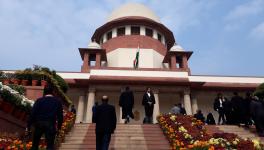Marital Rape Exception: Foundation of Consent is Right to Bodily Integrity, Argues Amicus Curiae Before Delhi HC
THE Delhi High Court on Monday continued to hear the arguments on a batch of petitions challenging Exception 2 to Section 375 of the Indian Penal Code (IPC) in the case of RIT Foundation & Ors. vs. Union of India.
Amicus curiae and senior advocate, Rajshekhar Rao, resumed his arguments that remained inconclusive today.
At the outset, Solicitor General(SG) Tushar Mehta informed the bench comprising Justices Rajiv Shakdher and C. Hari Shankar that the Central Government would require a reasonable time to formulate its stand. Mehta said the issue requires consultation by the government. He added that nothing imminent is going to happen in a couple of weeks.
Responding to SG Mehta, Justice Shakdher said that the bench is stuck in the midst of hearing and that it would like to conclude it.
“We will allow all other counsel to finish their arguments which will give you a little more time. In a matter like this, the government has to say, in principle, Yes or No because if they don’t how much they may deliberate, this is not going to come to an end”, Justice Shakdher told SG Mehta.
There are some matters for whatever reasons, the Court decides one way or the other. You take your time, you ask whoever you want to, Justice Shakdher further told Mehta.
Mehta submitted that ‘Yes’ or ‘No’ is an end product of the consultative process.
Resuming his arguments, Amicus curiae and senior advocate, Rajshekhar Rao, began by submitting that the more he read the law laid down by the Supreme Court, the more he felt unconvinced about the basis to preserve the Exception 2 to Section 375 IPC.
Rao flagged the consequences if the Court were to strike down the Exception. He submitted that in such an event, the husband will become somebody who falls within the definition of the relative under Section 376(2) of the IPC and that leads to aggravated rape and therefore enhanced punishment. The other aspect is the effect of Section 114A (Presumption as to absence of consent in certain prosecutions for rape) of the Indian Evidence Act. Rao submitted that senior advocate Rebecca John would address the Court on these points, and perhaps the Court may have to make recommendations or read down these sections as well if the Exception 2 to Section 375 is struck down.
Rao cited the decision of the Supreme Court in Aparna Bhat vs.State of Madhya Pradesh to make the submission on the inter-play of Articles 14 and 21 in the context of women’s rights and as to how the court should deal with the matter. Rao read out the quote from this judgment attributed to the Norweigian playwright and theatre director Henrik Ibsen. The quote read “A woman cannot be herself in the society of the present day, which is an exclusively masculine society, with laws framed by men and with a judicial system that judges feminine conduct from a masculine point of view.”
Justice Shakdher in a lighter vein remarked “It’s only men on this side of the bench and mostly men on the other side as well. Men sitting and judging something that concerns women”.
Continuing with his submission, Rao read out from judgment in the Aparna Bhat case as follows: “Violence against women in India is systematic and occurs in the public and private spheres. It is underpinned by the persistence of patriarchal social norms and inter-and intra-gender hierarchies. Women are discriminated against and subordinated not only on the basis of sex, but on other grounds too, such as caste, class, ability, sexual orientation, tradition and other realities..”.
He went on:
“Gender violence is most often unseen and is shrouded in a culture of silence. The causes and factors of violence against women include entrenched unequal power equations between men and women that foster violence and its acceptability, aggravated by cultural and social norms, economic dependence, poverty and alcohol consumption, etc. In India, the culprits are often known to the woman; the social and economic “costs” of reporting such crimes are high. General economic dependence on family and fear of social ostracization act as significant disincentives for women to report any kind of sexual violence, abuse or abhorrent behaviour. Therefore, the actual incidence of violence against women in India is probably much higher than the data suggests, and women may continue to face hostility and have to remain in environments where they are subject to violence. This silence needs to be broken. In doing so, men, perhaps more than women have a duty and role to play in averting and combating violence against women”, (Excerpts from the Supreme Court decision in the Aparna Bhat case as read by Rao during his submission).
Also Read: Amicus Curiae explains before Delhi HC why exception to marital rape should be struck down
Highlighting the role of the Courts and law enforcement agencies as neutral authorities, under a duty to ensure fairness, Rao quoted from the Aparna Bhat judgment as follows: “The role of all courts is to make sure that the survivor can rely on their impartiality and neutrality, at every stage in a criminal proceeding, where she is the survivor and an aggrieved party. Even an indirect undermining of this responsibility cast upon the court, by permitting discursive formations on behalf of the accused, that seek to diminish his agency, or underplay his role as an active participant (or perpetrator) of the crime, could in many cases, shake the confidence of the rape survivor (or accuser of the crime) in the impartiality of the court. The current attitude regarding crimes against women typically is that “grave” offences like rape are not tolerable and offenders must be punished”.
Rao thus sought to submit that if this is the expectation of the process as per the Supreme Court’s decision, the Exception under challenge, in the context of the wife, seems to suggest that the rape is tolerable.
This comment by Rao did not go down well with Justice Shankar who said “Comments like that create a problem. When you say in the context of wife it seems to be, is that your understanding of the Exception? Does the Exception say, in the context of the wife, that rape is permissible? It, first of all, says it is not rape, so it can never say that in the context of wife the rape is permissible”.
Justice Shankar went on to say that by such comments dialogue becomes skewed.
” You have to keep in mind that we have to keep a dispassionate attitude. I do not see how the Section says in the context of wife rape is permissible”, Justice Shankar remarked.
Justice Shankar also added that we are dealing with Section 375 IPC and till now this Section has not been read out in the Court. What has been read out is one sub-section, some examples. He sought to know from Rao whether there are any decisions in the past when a statute that said an act is not offence has been struck down by the Supreme Court or the High Court? Is there any precedence to guide as to how the courts have looked at such situations where the statute has not categorized a particular act as an offense but has been struck down?
Rao submitted that he has not come across any Indian decision on the point.
“Whether a law is discriminatory also has to be seen from the subjective perspective of the person who is impacted by the law”, Rao argued.
Justice Shakdher remarked ” If you look at 375 that defines rape. It adverts to sexual acts. When it is without will or consent, it is rape. It would have been rape even with the wife but for an exception. And it is this exception that is the problem as argued by the petitioner”.
Continuing with his arguments, Rao contended that the foundation of consent is right to the bodily integrity.
The law creates two buckets or more: one. it says if the act which are a,b,c,d done and are done against the will or without consent in a manner set out in Section 375, that act is rape. If it is another act that violates the bodily integrity of a person without her consent would tantamount to sexual assault but it may not tantamount to rape.
Rao read out the meaning of consent as mentioned in Section 375 to convey that consent has to be an unequivocal voluntary agreement, that is, express in no uncertain terms the willingness to participate in the specific sexual act. Rao, thus, submitted that a woman may say she is willing to participate in sexual Act ‘A’ but may refuse to participate in sexual act ‘B’.
Rao said against her will would necessarily mean without her consent. He referred to the decision in State of U.P. v.Chhotey Lal to say that ‘consenting’ as used in the law of rape means the consent of the will and submission under the influence of fear or terror cannot amount to real consent.
“Will is defined as wish, desire, pleasure, inclination, choice, the faculty of conscious, and especially of deliberate action. It is purely and solely a mental process to be ascertained, in a prosecution for rape, by what the prosecuting witness may have said or done..”, Rao quoted from the judgment of the Supreme Court in Chhotey Lal case.
Rao pointed that the Justice JS Verma committee had recommended criminalising marital rape but the Parliamentary committee did not recommend it as according to them it would destabilise the institution of marriage.
The object of the act is to criminalise a sexual act done by a man against the will of the woman. But the classification created by the Exception says the sexual act done by the husband with his wife against her will can be anything but rape, Rao argued.
Justice Shankar interjected to say ” Prima facie, it is not as though the exception is carving out a difference between married and unmarried women. It is carving out a difference between an act of sexual intercourse being committed within the parameters of a marital relationship and non-marital. The section creates an exception for a particular act. If we were to hold this unconstitutional then we would have to say that sex within marriage and outside marriage is not different. Prima facie, according to me the difference exists”.
Rao argued legislature has said all these acts are rape but when done by husband on wife, it is not rape. He added that the Exception denies the ability of the wife to prosecute her husband for the rape.
“Even if the wife does say No, the husband knows he is not engaging in rape but from the perspective of the wife, she is denied the ability to call an act which violates her sexually a rape. The law is saying because he is your husband you have to brush aside the word rape. Is the mere fact that you are married, you can be denied to call it rape? In a woman’s mind, the only reaction would be that the law is permitting rape by husband”, Rao submitted.
Rao’s arguments remained inconclusive for the day. Justice Shakdher before concluding the hearing for the day remarked that he had read in the newspaper that a woman was gang-raped and one of the perpetrators was her husband. In such a case, the husband can take defence of the Exception but the other accused cannot. Justice Shakdher said we thus need to see such situations also and that he would like senior counsel to assist the court on this.
The observations by the two Judges from the bench during the hearing seem to suggest that while Justice Shankar appears unconvinced with the petitioners’ argument, Justice Shakdher, on the other hand, seems inclined to allow the petitions. Justice Shankar’s observations, though, ought to be considered as prima facie only.
Get the latest reports & analysis with people's perspective on Protests, movements & deep analytical videos, discussions of the current affairs in your Telegram app. Subscribe to NewsClick's Telegram channel & get Real-Time updates on stories, as they get published on our website.
























